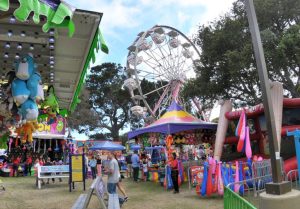By Jason Masters
Environmental Health Director

Fairs and Festivals
A
Q: Hello Jason, I’ve had a great summer and I love all the festivals in our area and throughout North Carolina! I’ve had a chance to try all kinds of foods that I wouldn’t normally have an opportunity to eat, (like liver mush! Yum!) and they have been delicious! As the Mountain State Fair approaches, is there anything I should be worried about as far as food goes? And what about food trucks in places like the wonderful festivals I’ve attended this year?
Vendors at festivals and other events are required to obtain a temporary food establishment (TFE) permit from the environmental health department before serving food. Our department makes a visit to the vendor, usually on the day of the festival or event, and after a review of menu items and preparation processes, as well as a checklist of items relating to general food safety, we issue a permit. It is important to note that no food is allowed to be prepared before the beginning of a festival. We won’t let Bubba use the same meat at this event that he patted out at last month’s burger festival. Now, here’s what you need to know…
There are no regulations relating to the people working at these TFEs. No one is required to be a certified food protection manager (like at restaurants) and (usually) no one from our office does an inspection after a permit is issued (except in the case of a multi-day event, like the mountain state fair, where there is potential for things to go awry).
When we issue a permit to a TFE, we only make sure that sanitation tools are in place. We can’t guarantee that anybody uses them on a regular basis. Yes, we make sure they have gloves. Yes, we make sure they have a means to wash their hands. Yes, we make sure the food they are preparing to sell appears to be maintained properly and safely. But that doesn’t mean that Bubba over at the burger tent is wearing his beard restraint and washing those enormous mitts of his after grabbing the meat for a big ol’ double bubba.
Now Jason, does that mean that nothing is safe at festivals and fairs?
Of course not!
Keep in mind that most of the people that own these business make their living selling food. It is certainly not in their best interest to simply ignore basic hygiene and food safety. To help ease your mind, here are some things to look for before ordering that deep fried double bubba:
-All temporary food establishments are required to have a canopy or tent over the entire operation. If you see someone selling shrimp cocktail off the back of a tailgate, they are probably not permitted.
-All TFEs are required to have some sort of ground cover. Concrete, asphalt and even grass is OK. Don’t let Bubba wade through the mud to take your 15 dollars
-All water must be from an approved source, and there must be a way to heat water on site. Lake Lure and Lake James are not approved sources.
-A means to wash, rinse and sanitize utensils must be on site, as well as sanitizer, and sanitizer test strips. If you see Bubba throw down some raw meat on top of an Igloo cooler, you might want to consider going back for that grilled cheese sandwich at the Queso-Loco food truck.
-A handwashing station must be available with hot water under pressure. We will even allow a cooler with hot water inside, but the water must be able to flow freely. Also, the water has to be caught in a bucket or container of some kind. We don’t want Bubba to get his boots all muddy before he steps on the onions.
-Food must be stored where it can be secured against tampering, and off the ground. Don’t let Bubba “go around back” to grab some more “real special” meat for your order.
-Cold holding equipment and food thermometers must be available and in working order. Of course, that doesn’t mean they will use them, but they at least have to be there.
The best advice I can give you is to pay attention to the surroundings, pay attention to the people working, and make good choices relating to what you eat at fairs and festivals. As always, if you have issues, go to the doctor so they can verify that you have a foodborne illness, and be sure to report it to the Environmental Health Department. If the fair or festival is still in town, we may be able to address the situation immediately. If you wait too long, though, those vendors may disappear faster than a funnel cake in front of a four year old.
Well, what about food trucks?
Here is the quick and skinny on food trucks, or Mobile Food Units (MFUs) as we call them. (We will save the really good details of MFUs for another issue…) Basically, an MFU is inspected the same way a restaurant is. They are required to have a certified food protection manager on site (or lose two points), they are required to have employee health policies on site, and follow all the other rules and regulations that a restaurant is required to follow. In addition, they are required to have a commissary that they “partner” with to store supplies, cleaning equipment and other food items they may not have room for on their truck. A commissary can be a restaurant, or an establishment that meets all the necessary requirements for a commercial grade kitchen, and must be a permitted establishment, and inspected on a regular basis. An MFU is required to return to their sponsoring commissary at the end of each day of operation for cleaning, dumping, refilling, etc.
Ok then, what about pushcarts? Is it safe to eat a hot dog in this town?
Pushcarts operate in much the same way as a mobile food unit. They are required to work in conjunction with a permitted commissary, they must return to the commissary at the end of each day of operation, and they are required to provide a list of events or locations at which they will be setting up. The pushcart itself must be inspected to ensure that all components are smooth and easily cleanable, and NSF (or commercial grade) approved. They are only allowed to use single service items, like wax paper, and plastic utensils, and…here is the big thing…they can only prepare hot dogs on the cart. They can’t grill you a burger. They can’t mix you up a milkshake. They can’t toss you a fresh salad. They can sell/serve things that have been previously pre-portioned, pre-wrapped and prepared (how’s that for an alliteration?) in their commissary, but that’s it. If you see somebody selling freshly prepared ceviche at a pushcart, it would probably be best to keep on moving.
So, to sum it up, Patsy, there are lots of things to be worried about, but with a little observation and some good decisions, you should be able to rest assured that the only reason you are throwing up is the double order of chili cheese fries with extra jalapenos, and the poor timing of riding the Cyclops right after.
Enjoy the fair, friends!


